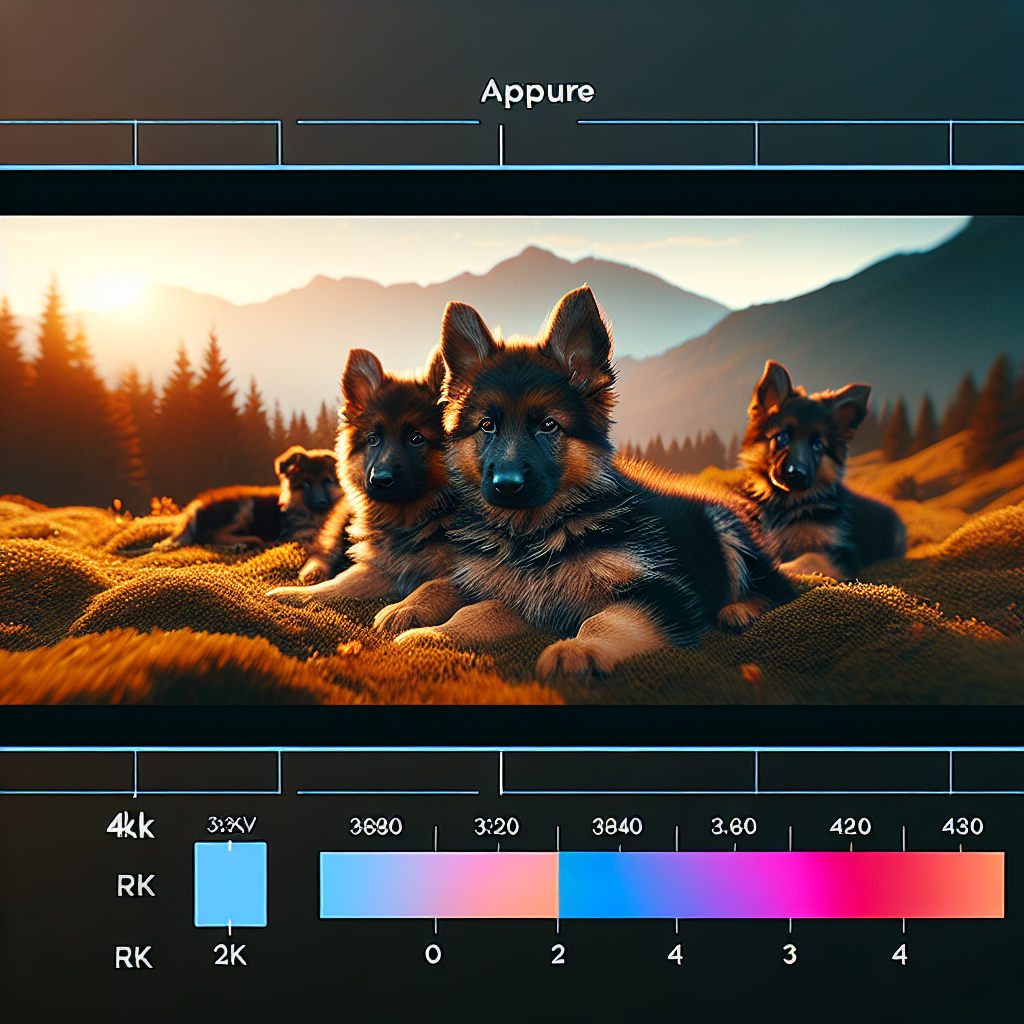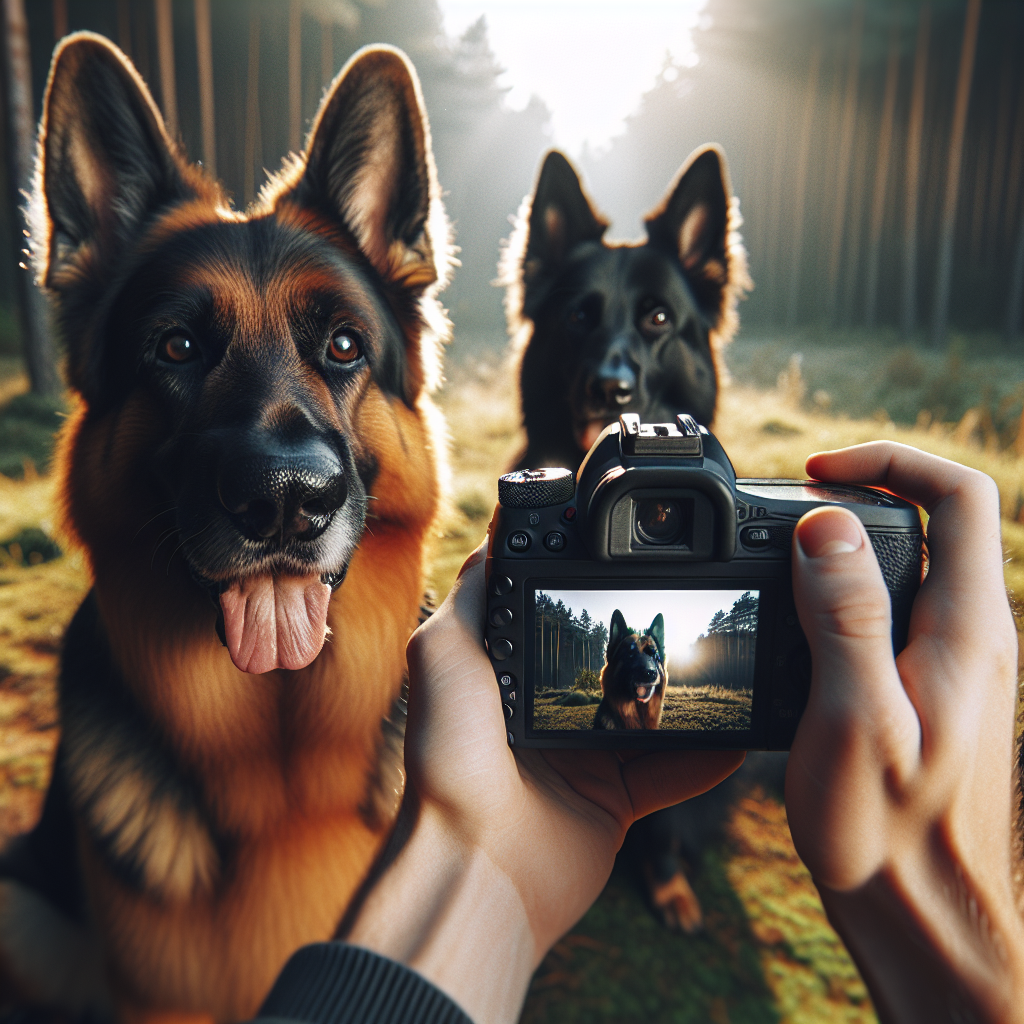German Shepherd Puppies

German Shepherd Puppies
-
Table of Contents
- Introduction
- Training Tips for German Shepherd Puppies
- Health and Nutrition Guide for German Shepherd Puppies
- Understanding the Temperament of German Shepherd Puppies
- Choosing the Right Toys and Accessories for German Shepherd Puppies
- Socializing German Shepherd Puppies: Importance and Techniques
- Conclusion
Introduction
German Shepherd puppies are a popular choice for many dog lovers due to their intelligence, loyalty, and versatility. These puppies are known for their striking appearance, with a strong and muscular build, erect ears, and a thick double coat. They are highly trainable and excel in various roles, including as working dogs, search and rescue dogs, and family pets. German Shepherd puppies require early socialization, consistent training, and plenty of mental and physical stimulation to thrive. With proper care and attention, these puppies can grow into well-rounded and devoted companions.
Training Tips for German Shepherd Puppies
German Shepherd puppies are known for their intelligence, loyalty, and versatility. They are often chosen as family pets, working dogs, or even search and rescue dogs. However, like any other breed, German Shepherd puppies require proper training to become well-behaved and obedient companions. In this section, we will discuss some training tips that can help you raise a well-rounded German Shepherd puppy.
First and foremost, it is important to start training your German Shepherd puppy as early as possible. Puppies have a natural curiosity and eagerness to learn, so taking advantage of this early on will make the training process much easier. Begin with basic commands such as sit, stay, and come. Use positive reinforcement techniques such as treats and praise to reward your puppy for following these commands. This will help them associate good behavior with positive outcomes.
Consistency is key when it comes to training German Shepherd puppies. Establish a routine and stick to it. Dogs thrive on structure and predictability, so having a consistent training schedule will help them understand what is expected of them. Set aside dedicated training sessions each day, but also incorporate training into everyday activities. For example, ask your puppy to sit before giving them their food or before going for a walk. This will reinforce the idea that good behavior is required in all situations.
Socialization is another crucial aspect of training German Shepherd puppies. Expose your puppy to different people, animals, and environments from a young age. This will help them become well-adjusted and confident dogs. Take them to puppy classes or arrange playdates with other friendly dogs. Gradually introduce them to new experiences such as car rides, loud noises, and crowded places. By exposing them to a variety of situations, you will help them develop into calm and well-behaved adult dogs.
Patience is essential when training German Shepherd puppies. Remember that they are still learning and may make mistakes along the way. Avoid getting frustrated or resorting to punishment. Instead, focus on positive reinforcement and redirecting unwanted behaviors. For example, if your puppy starts chewing on furniture, gently remove them from the area and give them a chew toy instead. This will teach them what is acceptable to chew on and redirect their attention to appropriate outlets.
In addition to basic obedience training, it is important to provide mental and physical stimulation for German Shepherd puppies. These dogs are highly intelligent and require plenty of exercise and mental challenges to prevent boredom and destructive behavior. Engage in activities such as puzzle toys, obedience training, and interactive play sessions. Take them for daily walks or runs, and provide opportunities for them to explore and use their senses. A tired puppy is a well-behaved puppy!
Lastly, remember to always be a calm and confident leader for your German Shepherd puppy. Dogs look to their owners for guidance and reassurance. If you are anxious or unsure, your puppy may become anxious as well. Use a firm but gentle tone of voice and maintain a relaxed body posture. This will help your puppy feel secure and trust your leadership.
In conclusion, training German Shepherd puppies requires consistency, patience, and positive reinforcement. Start training early, establish a routine, and socialize your puppy to different experiences. Be patient with their learning process and provide mental and physical stimulation. Finally, be a calm and confident leader. With these tips in mind, you can raise a well-behaved and happy German Shepherd puppy that will bring joy to your life for years to come.
Health and Nutrition Guide for German Shepherd Puppies
German Shepherd puppies are adorable bundles of energy and curiosity. As a proud owner of a German Shepherd puppy myself, I understand the importance of providing them with the best possible care, especially when it comes to their health and nutrition. In this article, I will share some valuable insights and tips on how to keep your German Shepherd puppy healthy and well-nourished.
One of the first things to consider when it comes to your German Shepherd puppy’s health is their vaccination schedule. Just like human babies, puppies need a series of vaccinations to protect them from various diseases. It’s crucial to consult with your veterinarian to ensure that your puppy receives all the necessary vaccinations at the right time. This will help build their immune system and keep them safe from potential illnesses.
Another aspect of your German Shepherd puppy’s health is regular check-ups with the vet. These check-ups are essential for monitoring their growth and development, as well as detecting any potential health issues early on. During these visits, your vet will also provide you with valuable advice on nutrition and exercise, tailored specifically to your puppy’s needs.
Speaking of nutrition, providing your German Shepherd puppy with a balanced and nutritious diet is vital for their overall health and well-being. When it comes to choosing the right food for your puppy, opt for high-quality, commercially prepared puppy food that is specifically formulated for large breed puppies. These foods are designed to meet the unique nutritional needs of growing German Shepherds.
It’s important to note that German Shepherd puppies have a higher risk of developing certain health conditions, such as hip dysplasia and bloat. To minimize the risk of these conditions, it’s crucial to avoid overfeeding your puppy and to provide them with regular exercise. Overfeeding can lead to rapid growth, which can put strain on their developing joints. On the other hand, regular exercise helps keep their muscles strong and their weight in check.
When it comes to exercise, German Shepherd puppies are known for their boundless energy. They require plenty of physical activity to keep them happy and healthy. Daily walks, playtime, and interactive toys are all great ways to provide your puppy with the exercise they need. However, it’s important to avoid excessive exercise, especially during their growth phase, as it can also put strain on their developing joints.
In addition to a balanced diet and regular exercise, it’s crucial to provide your German Shepherd puppy with plenty of fresh water. Hydration is essential for their overall health and helps maintain proper organ function. Make sure to clean and refill their water bowl regularly to ensure they always have access to clean water.
Lastly, don’t forget about the importance of mental stimulation for your German Shepherd puppy’s health. These intelligent dogs thrive on mental challenges and stimulation. Engage them in interactive games, puzzle toys, and training sessions to keep their minds sharp and prevent boredom.
In conclusion, taking care of your German Shepherd puppy’s health and nutrition is a crucial responsibility as a pet owner. By following a proper vaccination schedule, regular vet check-ups, providing a balanced diet, regular exercise, and mental stimulation, you can ensure that your puppy grows up to be a healthy and happy adult German Shepherd. Remember, a healthy puppy is a happy puppy!
Understanding the Temperament of German Shepherd Puppies

German Shepherd puppies are known for their intelligence, loyalty, and protective nature. They are one of the most popular dog breeds in the world, and for good reason. But before bringing a German Shepherd puppy into your home, it’s important to understand their temperament and what to expect.
I remember the first time I brought home my German Shepherd puppy, Max. He was full of energy and curiosity, always exploring his surroundings. It was clear from the start that he was a smart little pup, eager to learn and please. But along with his intelligence came a strong sense of independence. Max had a mind of his own and wasn’t afraid to show it.
German Shepherds are known for their strong-willed nature, which can sometimes be mistaken for stubbornness. They are highly trainable, but it takes patience and consistency. I quickly learned that positive reinforcement was the key to getting Max to listen and obey commands. Treats and praise became my best tools in training him.
Another important aspect of a German Shepherd puppy’s temperament is their loyalty. Max quickly formed a strong bond with me and my family. He would follow us around the house, always wanting to be by our side. This loyalty extends beyond just their immediate family. German Shepherds are known to be protective of their loved ones and will go to great lengths to keep them safe.
But this protective nature can also lead to some challenges. German Shepherds can be wary of strangers and may exhibit aggressive behavior if they feel threatened. Early socialization is crucial to ensure that they grow up to be well-rounded and friendly dogs. Exposing them to different people, animals, and environments from a young age will help them develop into confident and well-adjusted adults.
German Shepherds are also known for their high energy levels. They are an active breed that requires plenty of exercise and mental stimulation. Without proper outlets for their energy, they can become bored and destructive. Daily walks, playtime, and training sessions are a must to keep them happy and healthy.
One thing I’ve noticed about German Shepherd puppies is their sensitivity. They are highly attuned to their owner’s emotions and can often sense when something is wrong. Max would always come and sit by my side whenever I was feeling down, offering comfort and support. It’s this intuitive nature that makes them excellent therapy dogs and search and rescue dogs.
In conclusion, understanding the temperament of German Shepherd puppies is essential before bringing one into your home. They are intelligent, loyal, and protective dogs that require proper training, socialization, and exercise. With the right guidance and care, they can become loving and devoted companions for life. So, if you’re considering adding a German Shepherd puppy to your family, be prepared for a smart, energetic, and fiercely loyal friend who will bring joy and love into your life.
Choosing the Right Toys and Accessories for German Shepherd Puppies
German Shepherd puppies are known for their intelligence, loyalty, and playful nature. As a proud owner of a German Shepherd puppy myself, I understand the importance of choosing the right toys and accessories to keep them entertained and happy. In this article, I will share some tips and recommendations on how to select the best toys and accessories for your German Shepherd puppy.
When it comes to toys, German Shepherd puppies have a lot of energy to burn. They love to play and explore their surroundings. One of the first toys I bought for my puppy was a durable chew toy. German Shepherds have strong jaws, so it’s essential to choose a toy that can withstand their chewing habits. Look for toys made of tough materials like rubber or nylon. Avoid toys with small parts that can be easily chewed off and swallowed.
Another type of toy that German Shepherd puppies enjoy is interactive toys. These toys stimulate their minds and keep them engaged. Puzzle toys, for example, are a great option. They usually have hidden treats or compartments that the puppy has to figure out how to open. Not only does this provide mental stimulation, but it also helps prevent boredom and destructive behavior.
In addition to toys, accessories are also important for German Shepherd puppies. One accessory that I highly recommend is a sturdy leash and collar. German Shepherds are strong dogs, and having a reliable leash and collar is crucial for their safety during walks. Look for a leash made of durable material, such as nylon or leather, and a collar that fits comfortably around your puppy’s neck.
Another accessory that can be beneficial for German Shepherd puppies is a crate. Crates provide a safe and secure space for your puppy when you’re unable to supervise them. It also helps with potty training and prevents destructive behavior. Make sure to choose a crate that is large enough for your puppy to stand up, turn around, and lie down comfortably. You can also add a soft bed or blanket inside the crate to make it more comfortable for your puppy.
When it comes to choosing toys and accessories for your German Shepherd puppy, it’s important to consider their individual needs and preferences. Every puppy is unique, and what works for one may not work for another. Pay attention to your puppy’s behavior and observe which toys they enjoy the most. Some puppies may prefer squeaky toys, while others may prefer balls or ropes. Experiment with different types of toys to find out what your puppy loves the most.
Lastly, always prioritize safety when choosing toys and accessories for your German Shepherd puppy. Avoid toys with small parts that can be a choking hazard. Regularly inspect toys for any signs of wear and tear and replace them if necessary. Supervise your puppy during playtime to ensure they don’t swallow any small pieces.
In conclusion, choosing the right toys and accessories for your German Shepherd puppy is essential for their physical and mental well-being. Durable chew toys, interactive toys, a sturdy leash and collar, a crate, and other accessories can all contribute to a happy and healthy puppy. Remember to consider your puppy’s individual needs and preferences, prioritize safety, and enjoy watching your German Shepherd puppy have a blast with their new toys and accessories.
Socializing German Shepherd Puppies: Importance and Techniques
German Shepherd puppies are known for their intelligence, loyalty, and protective nature. They make excellent family pets and are often used as working dogs in various fields. However, like any other breed, German Shepherd puppies need proper socialization to ensure they grow up to be well-rounded and confident dogs. In this article, we will discuss the importance of socializing German Shepherd puppies and provide some techniques to help you in this process.
Socializing your German Shepherd puppy is crucial because it helps them develop good behavior and prevents them from becoming fearful or aggressive towards people or other animals. When a puppy is properly socialized, they learn to feel comfortable and confident in different situations, which makes them less likely to react negatively when faced with new experiences.
One of the most effective ways to socialize your German Shepherd puppy is by exposing them to a variety of people, animals, and environments from an early age. Take your puppy for walks in different neighborhoods, visit parks, and introduce them to friends and family members. Encourage people to gently pet and interact with your puppy, but make sure they do it in a calm and positive manner. This will help your puppy associate new people with positive experiences.
Another important aspect of socialization is exposing your German Shepherd puppy to different animals. Arrange playdates with other friendly dogs or take them to a dog park where they can interact with other canines. This will teach your puppy how to communicate and play appropriately with other dogs, which is essential for their overall development.
It’s also crucial to expose your German Shepherd puppy to various environments and situations. Take them for car rides, visit pet-friendly stores, and expose them to different sounds such as traffic, sirens, or fireworks. By gradually introducing your puppy to different stimuli, you can help them become more adaptable and less likely to develop fears or phobias.
When socializing your German Shepherd puppy, it’s important to remember that consistency is key. Make sure to expose them to new experiences regularly and in a positive manner. However, it’s equally important to avoid overwhelming your puppy with too many new experiences at once. Gradually increase the level of difficulty as your puppy becomes more comfortable and confident.
During the socialization process, it’s essential to pay attention to your puppy’s body language and reactions. If your puppy shows signs of fear or discomfort, such as cowering, hiding, or growling, remove them from the situation and try again later. Pushing your puppy too far can have a negative impact on their socialization progress.
In addition to exposing your German Shepherd puppy to new experiences, it’s also important to provide them with basic obedience training. Teaching your puppy basic commands such as sit, stay, and come will not only help them become well-behaved dogs but also build their confidence and strengthen the bond between you and your puppy.
In conclusion, socializing German Shepherd puppies is of utmost importance to ensure they grow up to be well-adjusted and confident dogs. By exposing them to a variety of people, animals, and environments from an early age, you can help them develop good behavior and prevent fear or aggression issues. Remember to be consistent, pay attention to your puppy’s reactions, and provide them with basic obedience training. With proper socialization, your German Shepherd puppy will become a happy and well-rounded member of your family.
Conclusion
In conclusion, German Shepherd puppies are intelligent, loyal, and versatile dogs that make excellent companions and working dogs. They require proper training, socialization, and exercise to thrive and reach their full potential. With their strong protective instincts and high energy levels, they are best suited for experienced owners who can provide them with the attention, mental stimulation, and physical activity they need. German Shepherd puppies can be a great addition to the right home, bringing joy, companionship, and a strong bond with their owners.





